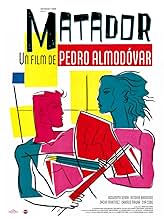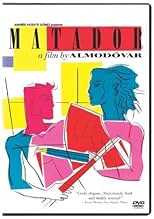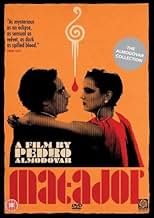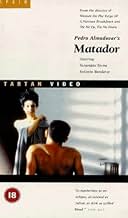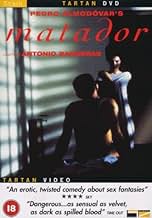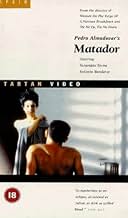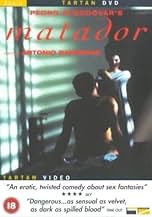AVALIAÇÃO DA IMDb
6,9/10
13 mil
SUA AVALIAÇÃO
Um toureiro é ferido por um touro e não pode mais matar na arena. É apenas uma falha, além de muitas outras de vários personagens que colidem de forma insuspeita.Um toureiro é ferido por um touro e não pode mais matar na arena. É apenas uma falha, além de muitas outras de vários personagens que colidem de forma insuspeita.Um toureiro é ferido por um touro e não pode mais matar na arena. É apenas uma falha, além de muitas outras de vários personagens que colidem de forma insuspeita.
- Prêmios
- 6 vitórias e 6 indicações no total
Nacho Martínez
- Diego
- (as Nacho Martinez)
Bibiana Fernández
- Vendedora Flores
- (as Bibi Andersen)
Verónica Forqué
- Periodista
- (as Veronica Forque)
Mercedes Jiménez
- Alumna 3ª
- (as Mercedes Jimenez)
Francesca Prandi
- Alumna 4ª
- (as Francesca Romana)
Enredo
Você sabia?
- CuriosidadesThe film that Maria and Diego stand watching at the cinema is King Vidor's Duelo ao Sol (1946), an equal lurid tale of wayward passion.
- Citações
Francisco Montesinos: I've told you not to shoot up in the dressing rooms!
- ConexõesFeatured in Playboy: The Story of X (1998)
Avaliação em destaque
Essentially seen by many as a warped sex fantasy that uses the codes and conventions of the detective thriller to disguise a darker, more psychological film about the wayward perversions and sinister desires of a seemingly affluent area of contemporary Madrid; Matador (1986) can also be seen as a not-so-subtle comment on the nature of modern-day relationships, aspirations and obsessions in a meta-textual form that makes continual use of its titular, bullfighting motif. Although it does have some slight thematic problems, particularly in terms of the overall tone of the film and eventual motivation of the characters, it is, nonetheless, one of Almodóvar's most interesting and perplexing films of this particular period; featuring a refinement of many of his earliest interests and characteristics from films like Dark Habits (1983) and What Have I Done to Deserve This? (1984), as well as being the film that signalled the move into the second phase of his career.
As the implications of the title would suggest, the film's narrative is bolstered by numerous references, both spoken and visual, to the obvious role-play and iconography of the bullfight. It is also a film about violence, and the sexuality of violence; an uncomfortable idea that is reinforced by the film's provocative opening sequence, in which we find the central matador of the title, Diego Montes, masturbating to violent scenes of exploitation cinema. The scene establishes the nature of the matador, both as a character and as a social phenomenon, as well as introducing the link between sex and death that will come to form an important thematic strand to the narrative. As the story progresses, the mechanisms of the drama conspire to throw together two separate characters that come to complement the unspoken desires and murderous lust that they seemingly share with one another, with the eventual courtship and inevitable seduction presented by the director as a surrogate bullfight in its self.
Where the film falls apart slightly is in the presentation of the character played by Antonio Banderas, a hyper-sensitive, implied homosexual who idolises the matador to the extent that he actually attempts to rape his young, fashion-model girlfriend (an act that eventually leads him to confess to a string of serial killings as a result of his mother's enforced, catholic guilt). It is a complex character, impeccably performed by the young Banderas, but his appearance ultimately sends the film off on a tangent that detracts from the central crux of the drama. Though the inclusion of this subplot does allow Almodóvar the chance to make a satirical comment on the nature of everything from fashion, to religion, sexuality, etc, these themes often feel like they've been handpicked from a completely different film, not always complimenting the central story, and too often leading it in directions that in the end feel unfinished or slightly unformed. Many of these loose ends can be glossed over, while some (the last minute implication of "second sight" as suggested by a solar eclipse) really seem to come out of leftfield.
Nevertheless, these are minor criticisms that don't necessarily destroy the ultimate intentions of the film - which really only become clear in the final scene - or the fantastic direction of Almodóvar and the performances of his cast. Although Matador certainly has its flaws (not to mention its detractors), it is, in my opinion, a fine little film and one of Almodóvar's most original and audacious creations. The performances are all incredibly committed, including the central pairing of Assumpta Serna and the late Nacho Martínez, as well the fine support from Banderas, the gorgeous Eva Cobo and Almodóvar regulars Carman Maura and Eusebio Poncela; whilst the central idea behind the script and the bold stokes of the director's intuitive grasp of the various film-making processes further refines and develops a number of themes that have come to be at the forefront of Almodóvar's career for the last twenty-five years.
As the implications of the title would suggest, the film's narrative is bolstered by numerous references, both spoken and visual, to the obvious role-play and iconography of the bullfight. It is also a film about violence, and the sexuality of violence; an uncomfortable idea that is reinforced by the film's provocative opening sequence, in which we find the central matador of the title, Diego Montes, masturbating to violent scenes of exploitation cinema. The scene establishes the nature of the matador, both as a character and as a social phenomenon, as well as introducing the link between sex and death that will come to form an important thematic strand to the narrative. As the story progresses, the mechanisms of the drama conspire to throw together two separate characters that come to complement the unspoken desires and murderous lust that they seemingly share with one another, with the eventual courtship and inevitable seduction presented by the director as a surrogate bullfight in its self.
Where the film falls apart slightly is in the presentation of the character played by Antonio Banderas, a hyper-sensitive, implied homosexual who idolises the matador to the extent that he actually attempts to rape his young, fashion-model girlfriend (an act that eventually leads him to confess to a string of serial killings as a result of his mother's enforced, catholic guilt). It is a complex character, impeccably performed by the young Banderas, but his appearance ultimately sends the film off on a tangent that detracts from the central crux of the drama. Though the inclusion of this subplot does allow Almodóvar the chance to make a satirical comment on the nature of everything from fashion, to religion, sexuality, etc, these themes often feel like they've been handpicked from a completely different film, not always complimenting the central story, and too often leading it in directions that in the end feel unfinished or slightly unformed. Many of these loose ends can be glossed over, while some (the last minute implication of "second sight" as suggested by a solar eclipse) really seem to come out of leftfield.
Nevertheless, these are minor criticisms that don't necessarily destroy the ultimate intentions of the film - which really only become clear in the final scene - or the fantastic direction of Almodóvar and the performances of his cast. Although Matador certainly has its flaws (not to mention its detractors), it is, in my opinion, a fine little film and one of Almodóvar's most original and audacious creations. The performances are all incredibly committed, including the central pairing of Assumpta Serna and the late Nacho Martínez, as well the fine support from Banderas, the gorgeous Eva Cobo and Almodóvar regulars Carman Maura and Eusebio Poncela; whilst the central idea behind the script and the bold stokes of the director's intuitive grasp of the various film-making processes further refines and develops a number of themes that have come to be at the forefront of Almodóvar's career for the last twenty-five years.
- ThreeSadTigers
- 3 de jul. de 2008
- Link permanente
Principais escolhas
Faça login para avaliar e ver a lista de recomendações personalizadas
- How long is Matador?Fornecido pela Alexa
Detalhes
- Data de lançamento
- País de origem
- Centrais de atendimento oficiais
- Idioma
- Também conhecido como
- 鬥牛士
- Locações de filme
- Viaducto de Segovia, Madri, Espanha(Bridge where Maria and Diego talk.)
- Empresas de produção
- Consulte mais créditos da empresa na IMDbPro
Bilheteria
- Faturamento bruto nos EUA e Canadá
- US$ 279.394
- Fim de semana de estreia nos EUA e Canadá
- US$ 13.399
- 13 de ago. de 2006
- Faturamento bruto mundial
- US$ 286.126
Contribua para esta página
Sugerir uma alteração ou adicionar conteúdo ausente


